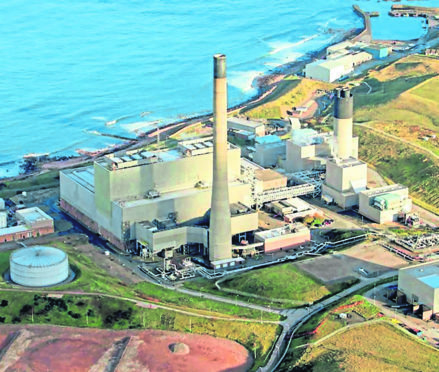Plans have been unveiled for a major upgrade of a north-east power plant.
Energy firm SSE has submitted proposals to set up a so-called “black start” facility at Peterhead Power Station.
This would involve the installation of 31 diesel engines which would not be connected to the national grid, but used to bring the site back into use in the event of a power shortage.
Construction work could begin at the end of the year with the 18 mega-watts backup system expected to be up and running by autumn next year.
The plant would be built within the power station grounds where a gas facility once stood.
An environmental appraisal report by SSE said full power outages are “extremely rare” and the facility would operate for less than 50 hours annually.
The document stated: “[This involves] black start events in which the auxiliary generators would be required to operate to restore power supply to the site, and provide a sustained load for up to seven days thereafter.
“These events are extremely rare, indeed there has never been a full black-out of the UK grid.
“The total annual running hours for the black start auxiliary generators, assuming no black start events, are expected to be under 50 hours per year.”
Last night, an SSE spokeswoman added: “Our proposal for Peterhead is to install a set of 31 diesel engines including the required infrastructure and fuel storage which, in the event of a black start being required, would be operated to bring Peterhead back to operational capacity.
“This 18MW auxiliary supply facility will not be connected to the grid as it is explicitly intended only to be used to return the Peterhead Power Station to service following a black out event.
“The planning application to Aberdeenshire Council does not require an environmental impact assessment, but as a responsible developer, we have assessed the environmental impact and included an Environmental Report with the application.
“Our proposal is to site the black start facility on the area previously occupied by the Peterhead Gas Reception Facility which was demolished in January 2011.
“Subject to receiving planning permission, we would anticipate construction beginning towards the end of 2018 with commissioning expected by the autumn in 2019.”
Peterhead Power Station began producing electricity in 1980 as a coal-fired station before being converted to burn North Sea gas.
Two decades later, its owners SSE completed a £200million upgrade to convert it into one of the world’s most environmentally advanced power stations.
A project to build a carbon capture and storage site at the plant was abandoned in 2015 when the UK Government pulled the plug on plans to finance the £1billion project.
